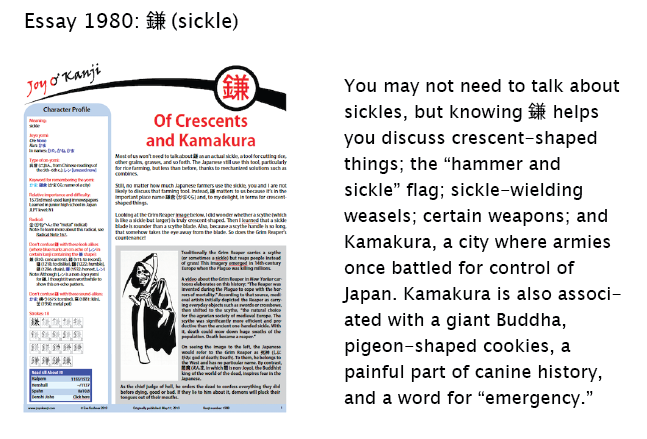Gridlike Curves, Absurd Fears, and the Folds of a Mountain
Let's start with a quiz. You may recognize 湾 from 台湾 (たいわん: Taiwan). And you might know 曲 as "musical composition," as in 曲調 (きょくちょう: melody, tune). The 曲 kanji also means "curve," as in 曲がる (まがる: to bend, curve), which is absurd, by the way. Could they not have represented that verb with a shape featuring even an iota of curvature? I might have chosen 為 (act; sake; because).
No one asked me, so let's focus on the following term and what it could mean:
湾曲 (わんきょく)
a. Taiwanese music
b. curves of a Taiwanese street
c. curve
d. waves
I'll block the answer with a preview of the newest essay:
Okay, here's the answer:
c. 湾曲 (わんきょく: bay + to curve) means "curve." As you can see, the first kanji represents "bay." I figured someone must have looked at the shape of a shoreline and come up with 湾曲.
But I was wrong! It turns out that the Chinese originally wrote this word as 彎曲 (to curve + to curve). Because the incredibly complex 彎 is non-Joyo, the Japanese eventually substituted 湾 as a phonetic stand-in.
The next term also starts with a non-Joyo kanji:
杞憂 (きゆう: absurd fear; needless anxiety) Qi, a state in ancient China + anxiety
Given the meaning of 杞, it might seem as if ancient history played a role here. No, ancient literature did; an old Chinese text called Liezi (列子) contains a passage that translates this way:
In the state of Qi, there was a person who couldn't sleep or eat well because he was haunted by the groundless fear that the sky might fall down, that the ground might collapse, and that he'd have no place to go.
Well, who hasn't been there?!
This passage gave rise to the following Japanese term:
杞人の憂い (きじんのうれい: lit. “a Qi person's fears”)
Qi, a state in ancient China + person + anxiety
The Japanese have abbreviated this expression as 杞憂 (きゆう: absurd fear; needless anxiety).
I like seeing the longer version because it brings my attention to うれい as the reading of 憂い—or rather one of three Joyo kun-yomi, in addition to the Joyo on-yomi ユウ. And to tell you the truth, if I saw 憂 out of context, I think I would have mistaken it for the look-alike 愛 (love). How quickly love arouses anxiety; maybe these kanji are closer in meaning than they initially seem!
I came across 杞憂 in a message from a friend about his son's marriage to a non-Japanese woman:
微妙な心の襞を理解し合えるのかなと思っていましたが日本語も身に付いてきてその私の思いは杞憂に過ぎませんでした。
At first, I felt anxious that they may not be able to understand each other’s subtle nuances, but as she gradually learned Japanese, my anxiety turned out to be unnecessary.
微妙 (びみょう: subtle); 心 (こころ: heart, mind); 襞 (ひだ: nuance); 理解し合う (りかいしあう: to understand each other, shown here in its potential form); 思う (おもう: to think); 日本語 (にほんご: Japanese language); 身に付く (みにつく: to be learned); 私 (わたし: I); 思い (おもい: thought); に過ぎない (にすぎない: to be no more than)
There's so much good stuff here! I'm particularly taken with 理解し合う. And then I always welcome a refresher on 身に付く and に過ぎない. But what particularly catches my eye (aside from the reddened keyword) is this term:
襞 (ひだ: (1) fold; pleat; gathers; tuck; (2) folds (e.g., of a mountain); crease; (3) (hidden) detail; nuance; shade; wrinkle (e.g., in logic); (4) lamella; gill (of a mushroom))
People usually write this word in hiragana, but my friend didn't, and I'm grateful for that. Seeing the kanji gives me a chance to compare it mentally to 壁 (wall, fence). So many look-alikes are floating around today, just waiting to take us down the wrong road!
And ... wow! I'm blown away that the same kanji represents both the pleats in a skirt and the folds of a mountain! In fact, 襞 also miniaturizes well, serving to symbolize the gill of a mushroom!
How wonderful that 襞 scales up and down to that extent. It's as if we could use 玉 (ball; spherical object; jewel) to describe a molecule (we can't) and an eyeball (we can, with 目玉, めだま) and a planet (we can't).
That's yet another fascinating aspect of kanji; if you pump a character full of air, figuratively speaking, you get to see whether it can depict bigger and bigger things or whether it will burst like a balloon!
Catch you back here next time!
❖❖❖
Did you like this post? Express your love by supporting Joy o' Kanji on Patreon:



Comments